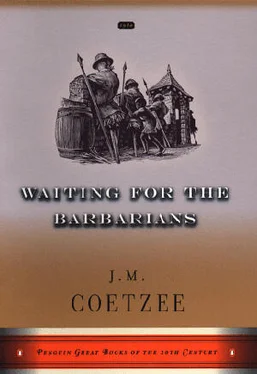"So." He lays the papers down carefully and squares the corners. I keep my silence. "I read only extracts. So that you could see the shape of things. It looks bad when we have to come in and clean up local administration. It isn't even our job."
"I will defend myself in a court of law."
"Will you?"
I am not surprised by what they are doing. I know very well the weight that insinuations and nuances can be made to bear or how a question can be asked in such a way as to dictate its answer. They will use the law against me as far as it serves them, then they will turn to other methods. That is the Bureau's way. To people who do not operate under statute, legal process is simply one instrument among many.
I speak. "No one would dare to say those things to my face. Who is responsible for the first deposition?"
He waves a hand and settles back. "Never mind. You will have your chance to reply."
So we contemplate each other in the stillness of the morning, till it is time for him to clap his hands for the guard to remove me.
I think about him a great deal in the solitude of my cell, trying to understand his animosity, trying to see myself as he sees me. I think of the care he has spent on my office. He does not simply hurl my papers in a corner and prop his boots on my desk, but instead takes the trouble to display to me his notion of good taste. Why? A man with the waist of a boy and the muscular arms of a streetfighter crammed into the lilac-blue uniform that the Bureau has created for itself. Vain, hungry for praise, I am sure. A devourer of women, unsatisfied, unsatisfying. Who has been told that one can reach the top only by climbing a pyramid of bodies. Who dreams that one of these days he will put his foot on my throat and press. And I? I find it hard to hate him in return. The road to the top must be hard for young men without money, without patronage, with the barest of schooling, men who might as easily go into lives of crime as into the service of the Empire (but what better branch of service could they choose than the Bureau!).
Nevertheless, I am not taking easily to the humiliations of imprisonment. Sometimes, sitting on my mat staring at three specks on the wall and feeling myself drift for the thousandth time towards the questions, Why are they in a row? Who put them there? Do they stand for anything?, or finding as I pace the room that I am counting one-two-three-four-five-six-one-two-three …, or brushing my hand mindlessly over my face, I realize how tiny I have allowed them to make my world, how I daily become more like a beast or a simple machine, a child's spinning-wheel, for example, with eight little figures presenting themselves on the rim: father, lover, horseman, thief… Then I respond with movements of vertiginous terror in which I rush around the cell jerking my arms about, pulling my beard, stamping my feet, doing anything to surprise myself, to remind myself of a world beyond that is various and rich.
There are other humiliations too. My requests for clean clothes are ignored. I have nothing to wear but what I brought with me. Each exercise day, under the eye of the guard, I wash one item, a shirt or a pair of drawers, with ash and cold water, and take it back to my cell to dry (the shirt I left to dry in the yard was gone two days later). In my nostrils there is always the mouldy smell of clothing that does not see the sun.
And worse. Under the monotonous regimen of soup and porridge and tea, it has become an agony for me to move my bowels. I hesitate for days feeling stiff and bloated before I can bring myself to squat over the pail and endure the stabs of pain, the tearing of tissues that accompany these evacuations.
No one beats me, no one starves me, no one spits on me. How can I regard myself as a victim of persecution when my sufferings are so petty? Yet they are all the more degrading for their pettiness. I remember smiling when the door first closed behind me and the key turned in the lock. It seemed no great infliction to move from the solitariness of everyday existence to the solitude of a cell when I could bring with me a world of thoughts and memories. But now I begin to comprehend how rudimentary freedom is. What freedom has been left to me? The freedom to eat or go hungry; to keep my silence or gabble to myself or beat on the door or scream. If I was the object of an injustice, a minor injustice, when they locked me in here, I am now no more than a pile of blood, bone and meat that is unhappy.
My evening meal is brought by the cook's little grandson. I am sure it puzzles him that the old Magistrate has been shut up all alone in a dark room, but he asks no questions. He enters very erect and proud, bearing the tray, while the guard holds the door open. "Thank you," I say, "I'm so glad you have come, I was getting so hungry…" I rest my hand on his shoulder, filling the space between us with human words, while he waits gravely for me to taste and approve. "And how is your granny today?"
"She is well, sir."
"And the dog? Has the dog come back yet?" (From across the yard comes his grandmother's call.)
"No, sir."
"It is spring, you know, it is the mating season: dogs go visiting, they stay away for days, then they come back without telling you where they have been. You mustn't be worried, he will come back."
"Yes, sir."
I taste the soup, as he wants me to do, and smack my lips. "Say to your grandmother, thank you for the supper, it is delicious."
"Yes, sir." Again the call: he picks up this morning's mug and plate and prepares to go.
"And tell me: have the soldiers come back yet?" I ask quickly.
"No, sir."
I hold the door open and stand for a moment in the doorway listening to the last twitterings of the birds in the trees under the great violet sky while the child crosses the yard with his tray. I have nothing to give him, not even a button; I have not even time to show him how to make his knuckles go click or how to catch his nose in his fist.
I am forgetting the girl. Drifting towards sleep, it comes to me with cold clarity that a whole day has passed in which I have not thought of her. Worse, I cannot remember certainly what she looks like. From her empty eyes there always seemed to be a haze spreading, a blankness that overtook all of her. I stare into the darkness waiting for an image to form; but the only memory on which I can absolutely rest is of my oiled hands sliding over her knees, her calves, her ankles. I try to recall our few intimacies but confuse them with memories of all the other warm flesh in which I have sheathed myself in the course of a lifetime. I am forgetting her, and forgetting her, I know, deliberately. Not from the moment when I stopped before her at the barracks gate and elected her have I known the root of my need for her; and now I am steadily engaged in burying her in oblivion. Cold hands, cold heart: I remember the proverb, touch my palms to my cheek, sigh in the dark.
In the dream there is someone kneeling in the shelter of the wall. The square is quite empty; the wind drives the dust in clouds; she huddles behind the collar of her coat, pulls her cap down to cover her face.
I stand over her. "Where does it hurt?" I say. I feel the words form in my mouth, then hear them emerge thin, bodiless, like words spoken by someone else.
She brings her legs forward awkwardly and touches her ankles. She is so small that she is almost lost in the man's coat she wears. I kneel, unlace the capacious woollen socks, unwrap the bandages. The feet lie before me in the dust, disembodied, monstrous, two stranded fish, two huge potatoes.
I lift one on to my lap and begin to chafe it. Tears well from behind her eyelids and run down her cheeks. "It is sore!" she wails in a tiny voice. "Ssh," I say, "I will keep you warm." I lift the other foot and hug the two together. The wind pours dust on us; there is grit on my teeth. I wake up with aching gums and blood in my mouth. The night is still, the moon is dark. I lie for a while looking up into blackness, then slide back into the dream.
Читать дальше












